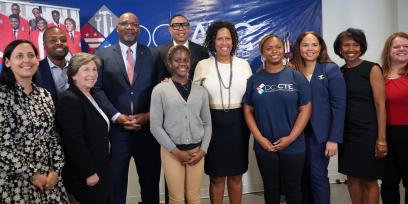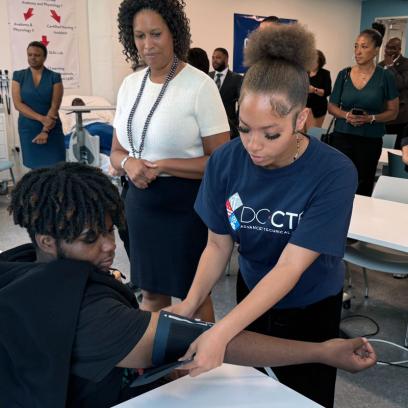In another indication that public-private partnerships are key to making career and technical education work, Washington, D.C., education leaders are celebrating a $9.5 million investment from Bloomberg Philanthropies that will go toward a new learning center for healthcare professions in an underserved area of the city.
“We are thrilled and grateful [for] the investments that are being made to reimagine the high school experience for D.C. high school students,” says Washington Teachers’ Union President Jacqueline Pogue Lyons. “This just shows what we can do when we all work together.”
The new school will build on the success of the Advanced Technical Center, which opened in 2022 with 96 students from eight schools across the D.C. area. Last year, enrollment more than doubled; 151 students now attend ATC several times a week. They earn college credits and graduate prepared to sit for the certified nursing assistant (CNA) certification, and have opportunities for paid internships in healthcare in their communities.
Collectively, ATC students have earned more than 1,100 college credits and saved nearly $900,000 in college tuition, notes D.C. Mayor Muriel Bowser. They have a significant leg up on careers that are “family-sustaining,” says AFT President Randi Weingarten. Not only do students get job training, they learn critical thinking, communication skills and relationship building, she added, and they are able to connect with employers who need eager young workers. “This is a win-win situation,” says Weingarten.
Expanding success
The new ATC campus will be located “east of the river,” a chronically underserved neighborhood, which is separated from higher-income areas by the Anacostia River. That will make a big difference to students like Syieda Tomlinson, an 11th-grader at Columbia Heights Education Campus and a first-year nursing student at ATC. She commutes to ATC on two trains and a bus, a journey that takes at least an hour “on a good day.”
But the travel has been worth it. “I have been able to get a feel of some of the college courses that I will have to take in the future for me to pursue my passion of becoming an obstetrician,” she says. She has learned fundamental healthcare skills and medical terminology, explored different healthcare professions, participated in “compelling” labs like blood typing and microbiology, and even competed in a statewide competition where she raised awareness of “period poverty,” the lack of menstrual resources in low-income areas. “This program has given me many opportunities that I am very grateful for,” she says.
These sorts of opportunities will be available to more and more students as ATC expands, thanks to the collaboration of Bloomberg, the D.C. mayor’s office and the Biden-Harris administration, which contributed a $4.1 million Career Connected High School grant to D.C.’s Office of the State Superintendent of Education. The president’s American Rescue Plan money has also been instrumental in providing the startup funds for this program.
“The president, the first lady, the vice president care so deeply about making sure our education system works for more Americans and provides real pathways for family-sustaining, middle class jobs,” says Lael Brainard, director of the National Economic Council. CTE programs like ATC are “win-win-win for students and educators, for businesses and for the economic health of our communities.”
“Preparing kids for career, college, civic participation and life is the work of all of us,” says Weingarten. “This grant from Bloomberg Philanthropies comes at exactly the right time for the right opportunity. We need to create the next generation of nurses, surgical techs, radiology techs, respiratory techs and so many more as we work to fill 4 million open national healthcare positions by 2031.
“This partnership helps seed and sustain our communities by creating a permanent pipeline of good jobs with good benefits starting in high school. That’s what school is about—helping students thrive and pursue their dreams, including living, working and raising a family. Educators and their unions, the school district and employers are working arm in arm, and we could not be prouder of this partnership.”
The Bloomberg project follows on the heels of a partnership with Micron, which is partnering with New York teachers to develop the New York Advanced Technology Framework, a plan that will train middle school and high school students for high-tech jobs and careers. The project is linked to the microchip manufacturing plants Micron is building in central New York, and a recent professional development session shows AFT educators are already engaged in the planning.
[Virginia Myers]


